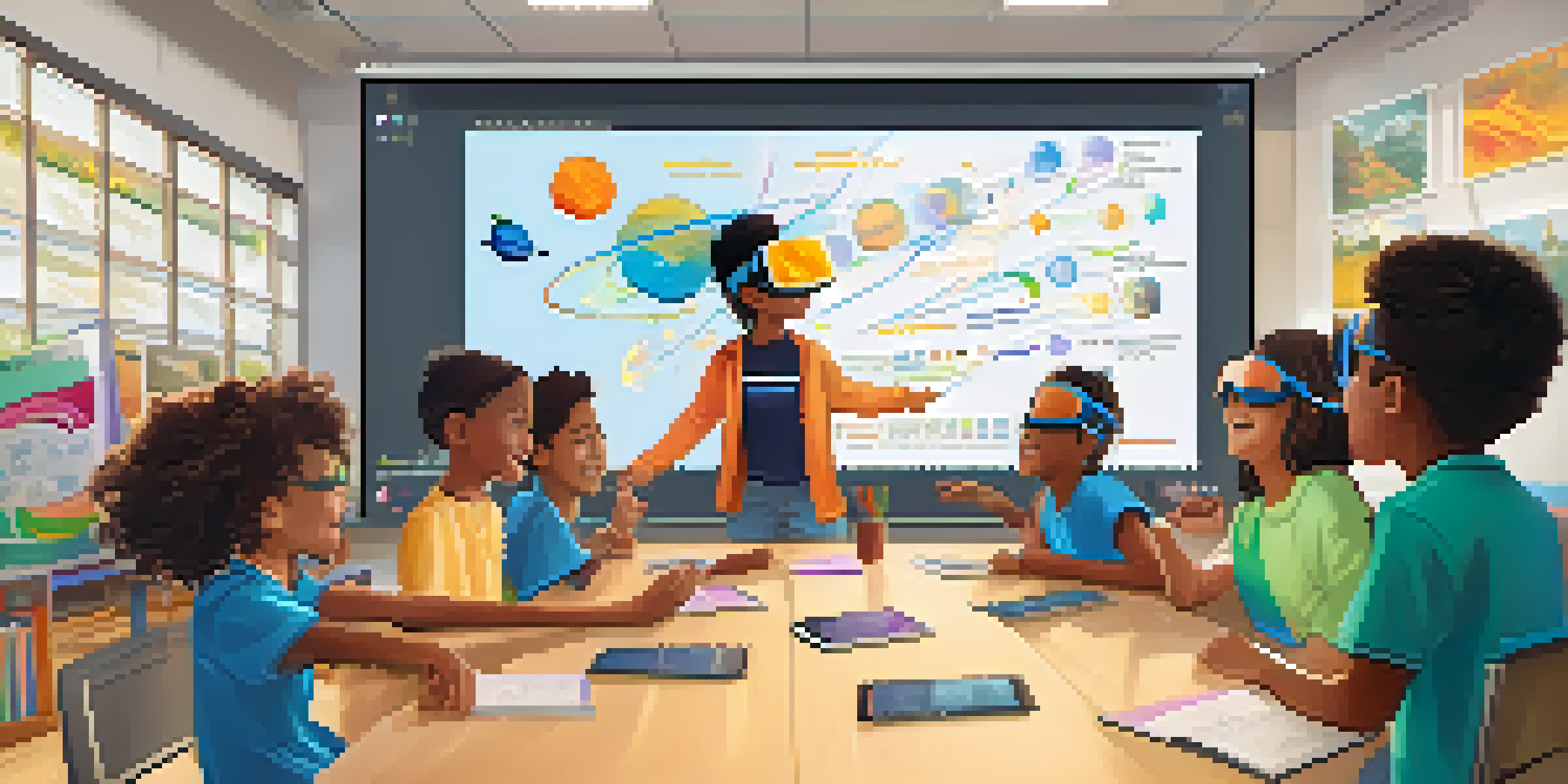The Role of Technology in Shaping Future Generations

The Evolution of Technology: A Brief Overview
Technology has evolved at an astonishing rate, transforming our daily lives and the way we communicate. From the invention of the wheel to the rise of the internet, each technological leap has reshaped societies. Today, we stand on the brink of another transformation with advancements in artificial intelligence, robotics, and virtual reality.
Technology is best when it brings people together.
As we look back, it's clear that each generation has been influenced by the tools and technologies available to them. For instance, the advent of smartphones has not only changed communication but has also altered social interactions and access to information. This continuous evolution prompts us to consider how emerging technologies will shape the experiences of future generations.
Understanding this evolution helps us appreciate the potential impact of technology on education, healthcare, and social structures. Each innovation brings new challenges and opportunities, urging us to adapt and rethink our approach to life. It's fascinating to ponder how the next generations will navigate a world filled with even more advanced tools and solutions.
Education: A New Frontier for Learning
Technology is revolutionizing education, making learning more accessible and engaging. Online platforms and digital resources allow students to learn at their own pace, breaking the traditional classroom mold. For instance, students can now attend virtual classes from anywhere in the world, gaining knowledge from experts without geographical limitations.

Additionally, tools like interactive simulations and educational apps provide hands-on experiences that enhance understanding. Imagine learning about the solar system through a virtual reality program that lets you explore space firsthand. Such immersive experiences are reshaping what it means to learn, making it more relatable and exciting for young minds.
Tech Revolutionizes Education
Technology is transforming education by making learning more accessible and engaging through online platforms and immersive experiences.
However, with these advancements come challenges, such as the need for digital literacy and the risk of screen fatigue. It's essential to strike a balance, ensuring that technology enhances education rather than detracts from it. As future generations grow up in this tech-rich environment, their relationship with learning will be fundamentally different from those who came before them.
Social Connections: Navigating Relationships in a Digital Age
In today's world, technology plays a crucial role in shaping how we connect with others. Social media platforms allow individuals to maintain relationships across distances, fostering a sense of community that transcends geography. However, these digital connections can also lead to a decrease in face-to-face interactions, prompting questions about the quality of relationships.
The greatest danger in times of turbulence is not the turbulence—it is to act with yesterday's logic.
For younger generations, growing up with technology means they often prioritize online communication. This shift can lead to both positive outcomes, such as increased global awareness, and negative consequences, like feelings of isolation. It's important for future generations to learn how to balance their online and offline interactions effectively.
As we move forward, understanding the impact of technology on social connections will be vital. Encouraging healthy communication habits and fostering empathy in digital spaces can help future generations develop meaningful relationships. Ultimately, navigating this new social landscape will shape their emotional intelligence and interpersonal skills.
Workplace Transformation: The Future of Employment
The workplace is undergoing a transformation driven by technology, and this shift will significantly influence future generations' career paths. Automation and artificial intelligence are redefining job roles, creating opportunities that didn’t exist before. For example, fields like data analysis and cybersecurity are growing rapidly due to the increasing reliance on technology.
Additionally, remote work has become more mainstream, allowing individuals to pursue careers without geographical constraints. This flexibility can lead to improved work-life balance, but it also requires strong self-discipline and time management skills. Future generations will need to adapt to this new working environment, equipped with skills that blend technical proficiency and interpersonal communication.
Balancing Digital Connections
As technology shapes social interactions, future generations must learn to balance online and offline relationships effectively.
As technology continues to evolve, so too will the nature of work, requiring ongoing education and adaptability. Emphasizing lifelong learning and resilience will be key for future generations. By embracing these changes, they can thrive in an ever-evolving job market.
Health and Wellness: Technology's Double-Edged Sword
Technology's influence extends to health and wellness, offering new tools for monitoring and improving well-being. Wearable devices, like fitness trackers, empower individuals to take charge of their health by providing real-time data about their physical activity and vital signs. This shift towards proactive health management is particularly beneficial for younger generations, who are more health-conscious than ever before.
However, the rise of technology also presents challenges, such as increased screen time and mental health concerns. Social media can contribute to anxiety and depression, especially among young people navigating their identities in the digital space. It's essential for future generations to develop healthy habits that prioritize mental wellness while engaging with technology.
Balancing the benefits and drawbacks of technology in health will be crucial in shaping future generations' well-being. Promoting awareness of the importance of mental health and encouraging digital detoxes can help cultivate a healthier relationship with technology. By doing so, we can empower the next generation to lead healthier, more balanced lives.
Environmental Impact: Technology's Role in Sustainability
As we face pressing environmental challenges, technology has the potential to play a pivotal role in sustainability efforts. Innovations like renewable energy sources and smart agriculture techniques are helping to address climate change and resource depletion. For future generations, leveraging technology for environmental protection can foster a sense of responsibility towards the planet.
Moreover, technology enables greater awareness and education about environmental issues. Social media campaigns and online platforms can mobilize communities, promoting eco-friendly practices and inspiring collective action. When young people are equipped with the knowledge and tools to make a difference, they become powerful agents of change.
Ethics in Technology Use
Understanding the ethical implications of technology is crucial for future generations to navigate the digital landscape responsibly.
However, it’s essential to ensure that technological advancements are sustainable and ethical. As future generations navigate these complexities, they must be equipped to make informed choices that benefit both society and the environment. By instilling a sense of stewardship, we can empower them to create a more sustainable future.
Ethics and Responsibility: Navigating the Digital Landscape
With great technological power comes great responsibility, and it's vital for future generations to understand the ethical implications of their digital actions. From data privacy to cybersecurity, young people today must navigate a complex landscape filled with challenges. Educating them about responsible technology use will be crucial in shaping their values and decision-making skills.
Additionally, discussions around digital citizenship are essential for fostering a culture of respect and accountability online. Teaching future generations about the impact of their words and actions in digital spaces can help create a more positive online environment. This understanding will be key to building trust and empathy in an increasingly interconnected world.

As technology continues to advance, instilling ethical considerations in young minds will ensure they approach innovation thoughtfully. By emphasizing the importance of responsibility and integrity, we can guide future generations in making choices that contribute to a better society. Ultimately, these lessons will shape how they interact with technology and each other.